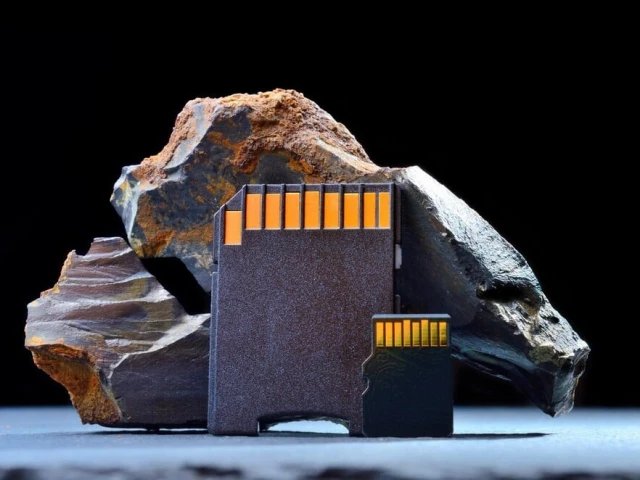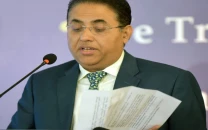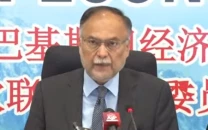IT, minerals to become game changers
FinMin points to growing global interest in Pakistan, efforts to remove barriers

Federal Finance Minister Muhammad Aurangzeb has said that the information technology and mineral sectors are going to be game changers for Pakistan's economy and Prime Minister Shehbaz Sharif is leading the economy and the nation will see the results soon.
Meeting Lahore Chamber of Commerce and Industry (LCCI) President Mian Abuzar Shad, Senior Vice President Engineer Khalid Usman and other business leaders, the finance minister pointed out that only nickel became a major export driver for Singapore with a $22 billion share in exports. "Copper has the potential to give similar dividends to Pakistan."
He said that global interest in Pakistan's mineral sector and IT potential was growing and the government was focused on removing all barriers to attract and facilitate both local and foreign investment in key areas. "We are public servants. I am visiting chambers to listen, understand and resolve problems of the business community," Aurangzeb remarked. "Industrial growth is only possible if we reduce financing costs, power tariffs and improve taxation policies."
The minister emphasised that Pakistan's economic direction was being steered with clear goals and results would be visible soon. As part of such efforts, hurdles to profit repatriation by foreign investors have been removed, which has boosted their confidence in Pakistan's market. "We are ensuring that the benefits of reduced inflation directly reach the common man. Middlemen will not be allowed to exploit the system," he stated.
Talking about taxation, Aurangzeb acknowledged that the salaried class was bearing a major burden as income tax was deducted at source. "We intend to offer relief to the salaried segment," he said. "If we can increase the tax-to-GDP ratio to 13%, we can offer broader relief to various sectors." To reduce the burden on state, the minister said, 24 national entities had been earmarked for privatisation and there was a need for reduced human interaction to resolve systemic issues.
Sharing his views, LCCI President Mian Abuzar Shad praised the government's efforts to curb inflation and reduce the policy rate. The State Bank's policy rate has been slashed from 22% in June 2023 to 12% now, "which will ease access to capital for businesses". Similarly, inflation has dropped sharply from 20.7% in March 2024 to just 0.7% in March this year, and "we are hopeful of continued improvement."
He mentioned the PM-led Uraan Pakistan programme, aimed at increasing economic growth, enhancing annual exports to $60 billion, attracting $10 billion in private investment per year, creating one million jobs every year, raising the renewable energy share to 10%, eradicating poverty and mitigating climate challenges.
In that regard, he highlighted the role of the Special Investment Facilitation Council in enhancing investor trust.
The LCCI president pointed out that the recent tariff measures taken by the Trump administration triggered uncertainties in global markets, but "Pakistan now has a unique opportunity". Tariffs on Pakistani products are relatively lower than those faced by regional competitors such as Bangladesh, Vietnam and Sri Lanka. "This provides us a chance to expand exports to the US market."
Turning to industrial performance, he said that the industry's share in gross domestic product (GDP) fell from 20% in 2017-18 to 18.2% in 2023-24. Similarly, in the first two quarters of the current fiscal year, the industrial growth remained negative at -0.66% and -0.18% respectively.
High business costs, including expensive raw material, gas tariffs, MDI charges on closed units and excessive duties, are making the industries uncompetitive, he lamented.
Shad also highlighted Pakistan's trade deficit in the first nine months of FY25, when it reached $17.9 billion, with industries shifting abroad due to the lack of facilitation. Additionally, in the first eight months of the current fiscal year, foreign direct investment was just $1.62 billion.
"This reflects the lack of confidence from both local and international investors. Unless we address the core problems of domestic industries, we cannot stabilise the economy," he remarked. The chamber president urged the government to ensure cheaper electricity and gas supplies to industries and push financing costs into single digits to promote exports and curb imports. "LCCI believes in expanding the tax base and urges the government not to overburden the existing taxpayers," he said. Instead, the taxpayers should be facilitated, "so that new entrants could join the tax system".
Shad stressed the need for reforms in tariff structure to promote industrial growth and recommended a cascading tariff model to ensure raw materials were taxed minimally to encourage local production and value addition.
Speaking on the occasion, LCCI Senior Vice President Engineer Khalid Usman called for revising the turnover threshold for withholding agents from Rs100 million to Rs250 million in light of sharp depreciation of the rupee and the prevailing economic conditions. He expressed concern over the Federal Board of Revenue's (FBR) continued issuance of notices and freezing of bank accounts despite a pending Supreme Court case about 1% capital value tax on the declared foreign assets under the amnesty scheme. "This practice is causing undue hardship to individuals and must be halted immediately."
He asked the government to ensure timely disbursement of tax refunds, particularly to exporters, to prop up liquidity, stimulate investment and maintain the momentum in economic activity. According to Usman, the FBR often delays refunds for up to a month, despite a 72-hour processing requirement under the FASTER system. "If refunds are not released within 15 days, the FBR should pay mark-up to exporters."























COMMENTS
Comments are moderated and generally will be posted if they are on-topic and not abusive.
For more information, please see our Comments FAQ